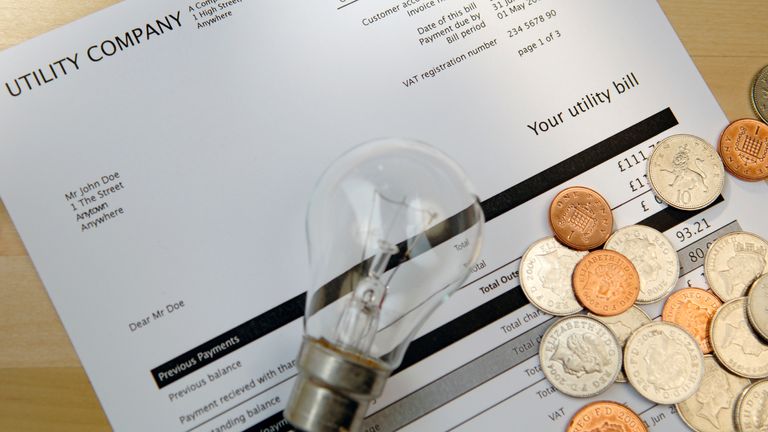Energy price cap plans to limit 'rip-off' bills reach Parliament
The PM says 11 million households will benefit from caps on "rip-off" tariffs despite suppliers warning they are anti-competitive.
Monday 26 February 2018 13:14, UK
Plans for price caps on controversial default energy tariffs are reaching Parliament for the first time, amid deep divisions on the wisdom of the intervention.
The Government's Domestic Gas and Electricity (Tariff Cap) Bill would allow the regulator, Ofgem, to limit standard variable tariffs (SVTs) until 2020, with the option to extend the cap annually until 2023.
SVTs - often the most expensive type of default charge - are paid by 11 million UK households, largely because they have failed to switch tariff or supplier.
A report by a regulator in 2016 found SVTs contributed £1.4bn in excess profits to energy companies.
There has already been support for five million properties perceived as vulnerable through pre-payment meter caps and other discounts.
But Prime Minister Theresa May signalled that her patience on default charges had run out after efforts to force the issue through the regulatory system failed.
She said on Monday: "It's often older people or those on low incomes who are stuck on rip-off energy tariffs, so today we are introducing legislation to force energy companies to change their ways.
"Our energy price cap will cut bills for millions of families. This is another step we are taking to help people make ends meet as we build a country that works for everyone."
Members of the the so-called "big six" energy firms have hit out at the proposed caps - insisting they are anti-competitive.
Centrica, the owner of the country's largest supplier British Gas, told Sky News last week the measure was one reason why it had taken the decision to shed 4,000 jobs by 2020.
It had already pledged to scrap SVTs in favour of customers who fail to switch on to new fixed rate tariffs and argued that caps risked reducing competition among the UK's supply base - currently running at more than 60 firms.
Another - EDF Energy - responded on Monday: "EDF Energy believes the energy market is becoming ever more competitive with new suppliers and innovation which is benefiting millions of customers.
"A temporary price cap can protect customers who are still not active.
"The Bill should require the regulator to set this cap at a level where it doesn't reverse or stop the growth in competition, and it's important that all costs are reflected in the cap, including costs of the smart metering programme.
"All suppliers - large and small - should also bear their share of social and environmental programme costs. Today's small supplier exemptions unfairly push these costs onto customers of other suppliers."
Rebecca Long Bailey, the shadow business secretary, said: "Today's action, whilst welcome, will do little to comfort customers facing price hikes now after the Government delayed this bill by over a year.
"The Government promised action on energy bills a year ago yet energy costs are still spiralling and four million households live in fuel poverty.
"A price cap is simply a temporary sticking plaster and the Government must realise that they need to do much more to fix our broken energy market."
Richard Neudegg, head of regulation at the price comparison site uSwitch said: "The Government's introduction of this price cap might be well meaning but is fraught with potential unintended consequences that will need to be carefully managed.
"A price cap is not a magic bullet - the biggest danger is that it risks giving consumers a false sense of security that their bills will be lowered."
While Kevin Pratt, consumer affairs expert at MoneySuperMarket, added: "It's also possible that energy firms will raise the cost of their cheap fixed rate tariffs to compensate for any reduction in the price of their variable rate deals.
"That would penalise savvy consumers who already shop around for the best-value tariffs."





